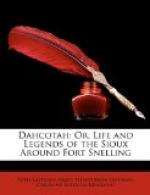The women had not their paddles with them, and there was an eddy in the current; as soon as the canoe was pushed from the shore, it would whirl round, and the delighted Chippeways caught the canoes, and pulled them ashore again, while others let fall upon their victims the uplifted tomahawk.
When the Chippeways had killed until they were tired they took what they wanted from the Sioux camp, and started for home, taking one Dahcotah boy prisoner. The party had not travelled far, when a number of Dahcotahs attacked the Chippeways, but the latter succeeded in killing many of the Dahcotahs. One of the latter fled, and was in his canoe on the lake St. Croix, when the Chippeways suddenly came upon him.
The little Dahcotah saw his only chance for liberty—he plunged in the water and made for the canoe of the Dahcotah. In a moment he had reached and entered it, and the two Dahcotahs were out of sight before the arrows of their enemies could reach them.
A very few of that band escaped; one of them says that when they were first attacked by the Chippeways, he saw he had but one chance, so he dived down to the bottom of the river, and the Chippeways could not see him.
He found the water at the bottom of the river very cold, and when he had gone some distance, he ventured where the water was warmer, which he knew was near the shore. He then came out of the water and made his escape.
Even this latter trifling incident has been handed down from father to son, and is believed universally by the Dahcotahs. And according to their tradition, the lovers and family of Wenona perished in this battle. At all events, there is no one who can prove that their tradition or my translation may not be true.
THE INDIAN IN A TRANCE.
* * * * *
About forty years ago, Ahak-tah, “The Male Elk,” was taken sick with a sore throat. It was in the winter too, and sickness and cold together are hard to bear. Want was an evil from which they were suffering; though the Dahcotahs were not so poor then as they are now. They had not given so much of their lands to the white people; and they depended more upon their own exertions for support than they do at present.
The medicine men did all they could to cure Ahaktah; they tried to charm away the animal that had entered into his body; they used the sacred rattle. But Ahaktah’s throat got worse; he died, and while his wives and children wept for him, he had started on his long journey to the land of spirits.
He was wrapped in scarlet cloth, and laid upon a scaffold. His wives sat weeping in their teepee, when a cry from their young children drew their attention to the door. There stood he for whom they mourned. The dead man again took his place among those who sat beside the household fire. Tears of grief were shed no more—food was given to Ahaktah, and when he was refreshed he thus addressed his wondering family:—




